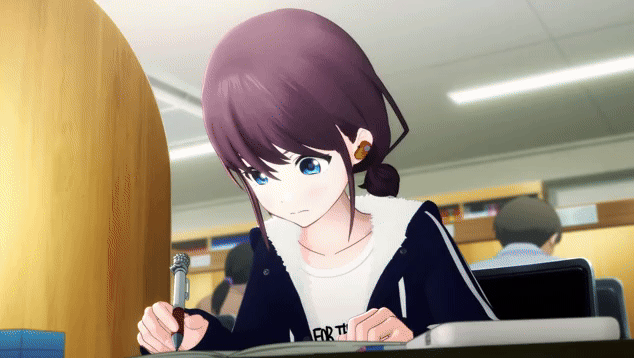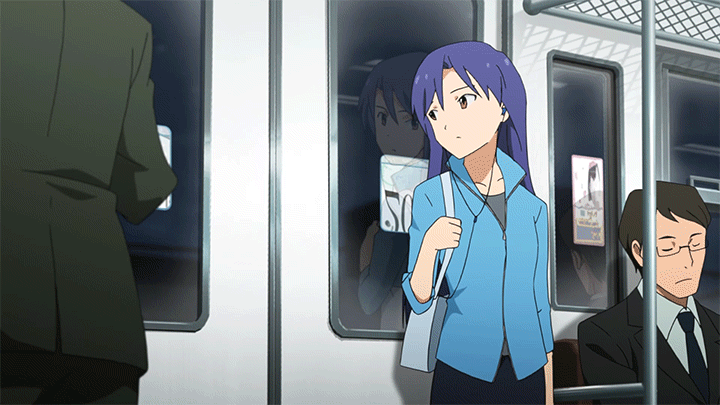ROCKBOUND NEIGHBORS by Mizuki Nana (Album Review) ▸ J-Music Exchange/Rate
Talking about, quite possibly, the greatest seiyuu artist of all-time
Hello and once again, welcome back to yet another J-Music Exchange/Rate review! In case you’re new around here, allow me to explain: this is a segment that I do with my good friend/fellow Japanese music enthusiast Leap250 where we both pick out an album from our libraries, exchange them with each other, take a listen to it, and ultimately give our thoughts on them on our respective blogs. I’m happy to say that we are entering our FIFTH (5) year of doing the E/R on a consistent basis, which is… frankly insane to me. I’m sure Leap and I are gonna come up with a special thing in order to celebrate half-a-decade of this segment, so I hope you all stay tuned for another fantastic year of album reviews!
In any case, let’s talk about the theme we settled on, which is something Leap and I determine for our album choices each month. It was my turn to open up the year, and considering that I broke my yearly streak of not including one of these kinds of artists in my year-end roundup last month, I figured I’d ‘revitalize’ my interest in them through this month’s subject: albums from voice actors/seiyuu. If you know me well, I’ve been a gigantic follower of seiyuu (especially through various 2.5D multimedia franchises such as Love Live, IDOLY PRIDE and D4DJ) and its accompanying fan culture. In addition, it’s been so cool to see these lovable voice actors & actresses go beyond their usual talents with acting in visual media, and try their hands at creating/performing music. There have been so many great instances of this; with some of my favorites being Ogura Yui, Uchida Maaya, Kobayashi Aika, Kusunoki Tomori, the Sphere/TrySail units, and many more.
That said, here are our first two album reviews for the new year: Leap went ahead and tossed over ROCKBOUND NEIGHBORS from the one-and-only Mizuki Nana, while I gave him a familiar name in Furihata Ai’s Super moon.
Let’s jump right in!

Mizuki Nana (水樹奈々) is a Japanese voice actress, narrator and singer who is currently represented by StarCrew and releases music under the KING RECORDS label. Mizuki got her start in music at the age of five, when she began doing enka lessons and performed in local singing competitions. In 1993 (when she was only 13-years-old), she released her first enka single, titled Tsugazakura, under her real name of Kondo Nana. After high school, Mizuki decided to pursue voice acting as a career and attended/graduated from the Yoyogi Animation Academy in 1998. Her first role was for a PlayStation 1 simulation video game, Noël La Neige, as the voice of Kadokura Chisato.
From there on, Mizuki Nana’s career has had an insane upward trajectory, as she has appeared in many mainstream anime/game franchises like Naruto, Mahou Shoujo Lyrical Nanoha, the Persona series, Senki Zesshou Symphogear, and Precure, to name a few. In addition, she has provided numerous opening & ending themes to these shows, many of which have become well-known and classic hits such as “Synchrogazer” and “ETERNAL BLAZE”. Between topping Oricon charts, winning various accolades (‘Best Musical Performance’ at the 2007 Seiyuu Awards) and even becoming the first voice actor to appear on the illustrious NHK Kouhaku year-end event, her strong vocals have been praised by fans and fellow voice actors alike, making her an icon within the anime/otaku world.
As of this post’s publish date, Mizuki Nana has released eighteen albums and fourty-two singles in total.
(info sources: Mizuki Nana Official Website, Wikipedia JP, D4DJ Wikia, Kayo Kyoku Plus, judasmartel [Reddit])
Tracklist
Avalon no Oukan / アヴァロンの王冠
Naked Soldier
Get my drift?
Lovely Fruit
Darling Plastic / ダーリンプラスティック
BRIGHT STREAM
Hoshikuzu Symphony / 星屑シンフォニー
LINKAGE
STAR ROAD
Synchrogazer -Aufwachen Form-
Crescent Child
Kiseki no Melodia / 奇跡のメロディア
METRO BAROQUE
Happy☆Go-Round!
Sacred Force (Extended Mix)
Yakusoku / 約束
Released: 2012.12.12
If there’s ever been a shortlist of names that truly deserve the title of anison royalty, Mizuki Nana would no doubt have one of the strongest claims to the throne. And honestly, I can’t help but marvel at how lucky we anime fans are that she chose to lend her incredible voice to this corner of Japanese entertainment. With her natural vocal talent and a unique upbringing—having trained as an enka singer from a young age—she could’ve easily thrived in a different musical sphere. But instead, she made this world her stage, and I couldn’t be more grateful to be along for the ride.
ROCKBOUND NEIGHBORS feels like the perfect encapsulation of everything that makes her such an icon in the world of not just anison but Japanese music as a whole. Released in 2012, this album is equal parts theatrical and heartfelt, blending her unique commandeering voice with a mix of hard-hitting rock, electro synth, sweeping orchestral arrangements, and tender ballads. There’s a real sense of grandeur felt in most of the tracks here, almost like you’re sitting front row of a theatrical play or a musical. From the explosive opener “Avalon no Oukan” to the emotive peaks of “Kiseki no Melodia,” most of everything on the album gives off an epic feeling. However, at the same time, it's also tastefully varied. Tracks like “Lovely Fruit” show off her playful side, while the anthem-like “BRIGHT STREAM” serves up that signature anison energy she’s known for. And of course, undeniably the star of the entire record, there’s “Synchrogazer” — just a badass, high octane, final boss-worthy theme that's guaranteed to leave you breathless.
What truly ties the album together, though—and this might sound a bit odd to say—is Mizuki Nana herself. While the songs might feel a bit incongruent stylistically, her voice acts as the glue that holds everything together. No matter the genre or mood, there’s never a moment where you forget that it’s her singing. Her distinct, instantly recognizable tone, paired with her incredible range and masterful use of vibrato, elevates each track and makes every song feel undeniably hers.
1 ▸ familiarizing myself with an icon
I’ll be honest here and say that I’m actually not that familiar with Mizuki Nana, nor have I listened to a ton of her music. I feel like this is due to a combination of things, such as my overall taste in music, the anime I usually watch, the kind of seiyuu I gravitate towards, and just the fact that I’m more familiar with newer VAs in the industry. This is *absolutely not* some sort of slight at her (lol), and I am very much aware of how popular and talented she is—both as a voice actress and a singer—but I just wanted to clarify my prior knowledge about her.
And the way I wanted to start this review is similar to how I went about discussing Vai! Ya! Vai! from singer JUNNA back in 2023 (which is a bit of an interesting coincidence, considering that the two franchises they’re respectively a part of, Macross Delta and Symphogear, are often compared to each other). Primarily because in my opinion, Mizuki Nana’s voice truly is the main star of this album and without-a-doubt she has an incredibly strong presence in a lot of these tracks. Being someone who has mostly been exposed to her voice through a couple of her popular tracks like the infectiously fun “DISCOTHEQUE” (not on this album) or the epic & electronic-filled energy of “Synchrogazer” (is on this album); I already had a bit of familiarity while going through this album’s tracklist, but it’s pretty fascinating to actually sit down and properly listen to/appreciate her vocal talents here.
And what I’m about to say is in no way an original opinion, but I feel like Mizuki Nana’s voice and her abilities as a singer can easily be compared to her experience as a voice actor. Meaning that she has the vocal prowess and- most notably, the vocal range to perform a wide variety of tones really, really well. For context, and while I’m personally not too knowledgeable with the anime she’s appeared in, she’s done a fantastic job voicing a ton of different personalities; whether that’s a soft-spoken kunoichi (Hyuuga Hinata - Naruto), a lively-yet-determined high school girl & phantom thief (Takamaki Ann - Persona 5), a more serious-minded pop singer (Kazanari Tsubasa - Symphogear), or even a kind motherly figure like Chino’s mom in GochiUsa.
And again, the point I’m trying to get at here is that, that is essentially one of the big things I got out of this ROCKBOUND NEIGHBORS album. We get to hear Nana sing over a solid variety of music styles and it starts off with “Avalon no Oukan”; a song that almost feels textbook, as we immediately get hit with this dramatic, violin & trumpet-filled, chorus-backed atmosphere that leads into Nana’s deeper and renowned vocal register. Seems like this is a music style that a lot of people are familiar with whenever they think of her as a singer, and no doubt Nana performs it well. The way she asserts a great sense of power here and how her voice just smoothly glides alongside the grand & almost ‘heroic’ nature of the music is quite phenomenal, and we get to hear many more cool instances of this throughout the tracklist like with “BRIGHT STREAM” or the more rock-focused atmosphere in “Get my drift?”.
And amongst these impassioned-sounding songs, Nana also throws in a few different tracks into the mix such as “Lovely Fruit”, which also might be my favorite one out of the bunch (or at least, the one I seemed to go back to the most). Maybe this stems from my existing appreciation for “DISCOTHEQUE”, but I thought this song was a slapper. It has a very fun 2000s J-Pop vibe to it, I really enjoyed the inclusion of an acoustic guitar here and I think Nana’s vocals still worked super well in a more light-hearted track like this one.
With that, I started to realize while going through ROCKBOUND NEIGHBORS how versatile Mizuki Nana’s voice really is. Obviously this is the case when it comes to her voice acting, but music-wise: as much as she excels at performing in a fierce manner, I feel like this album proves that she can easily tone it down and even lighten up a bit, all while still giving a fantastic vocal performance. This is especially the case with the final song on this album, “Yakusoku”. With how gorgeous Nana’s vocals can sound, it was only right that she got to sing alongside a slower piano ballad and this combination truly felt like a match made in heaven.
2 ▸ a peculiar approach to a seiyuu album
A term that Leap has, sort of, coined here on the Exchange/Rate (as well as one that I also started using) is ‘grab bag’. It’s usually an accurate description of how a lot of these voice actors/seiyuu approach their solo careers; meaning they tend to grab a few different composers to collaborate with and, like I said earlier, perform songs of varying styles. For me personally, especially being someone who has listened to a lot of seiyuu-related music, I usually am not *too* critical about this certain methodology.
For one, I’m simply happy to see the voice actors I follow/like release any kind of music; and two, this makes sense for most of these talents who are only starting out, more as it’s a way for them to dip their toes into the world of singing and to see what sticks/works with their own individual voices. You can hear this with a lot of the seiyuu-turned-artists that have come to existence these past twenty years; one that immediately comes to mind is a previous release I suggested to Leap, Gradation Collection from Kobayashi Aika. As much as it did feel like an interesting mish-mash of songs, ranging from rock-based numbers to a fun country-pop tune, I still consider that Aikyan album to be one of my all-time favorite seiyuu releases due to the fact that we finally got to hear her sing outside of her usual area of work within the Love Live franchise.
That said: this Mizuki Nana album actually doesn’t veer *too* far from the overall themes/genres many of these songs convey. Of course, and as I alluded to earlier, Nana’s vocals are quite distinct and do work with a certain tone, so it makes sense that a lot of these songs feel ‘extraordinary’ and ‘grandiose’ with its usage of violins and intense guitars. But it also might be thanks in part to the connections a lot of these songs have with various types of otaku media; whether it’s the fact that half of the songs on this tracklist were used in an anime or a video game, and/or how many of them were composed & arranged by members of Elements Garden (a team that specializes in creating music for different shows/games; e.g., BanG Dream!).
What I do have a problem with though is that… this album honestly felt like it might’ve been too long.
When it comes to the topic of ‘album length’, it’s very much a case-by-case situation. This is definitely not me implying that albums need to be a certain length for people to enjoy it; I’m sure there are a ton of records that are multiple hours long, yet are incredible to listen to the whole way through due to how well they’re organized or how engaging each song can be.
The main thing I want to emphasize here is ‘intent’. And like I just said a couple paragraphs ago, because literally half of this album contains a bunch of media tie-ins (most of which I’m sure were created for/centered around intense, action-packed stories and worlds), it gets to a point where it just feels *too* coherent. Because we’re listening a lot of these loud, epic songs with Nana’s consistently powerful vocals, it eventually became a bit fatiguing to me and a good chunk of these songs started to meld into each other, to the point where I couldn’t get through the entire album on a couple of my later listen-throughs.
And to be honest, I wouldn’t rule out putting some of the blame on myself for how I perceived this album. I 100% do not think Nana *herself* is at fault here and again, it could be my own personal preferences for music (especially when it comes to seiyuu releases) or the fact that I might just have a short attention span. But I feel like combining an almost-album’s worth of anison-focused songs with an equal amount of new/original compositions was not the wisest move here. I genuinely believe if they cut this album down to, like, 10-12 tracks total, it would’ve been easier to digest while at the same time, still providing a good balance of those heroic-sounding songs and interesting offshoots like a “Lovely Fruit” or a “STAR ROAD” in order to take a quick breather in between.
Rating: 7/10
Aaaaand that’s all I got for you today!
To reiterate/clarify, this wasn’t a jab at Mizuki Nana and her artistry, but rather the organization of this album. I think she’s a phenomenal singer and someone who obviously has a great talent with performing music, and I hope my own gripes and that numerical score doesn’t make it seem like I think she’s a bad artist or anything like that (lol).
On a related note, it was also her birthday recently (January 21) so big belated happy birthday to her! 🎉
And now that you’re done here, definitely go head on over to Leap’s blog where he talked about the album I gave him: Super moon from Furihata Ai. There actually happens to be an interesting connection between these two artists, as they both appeared in the Love Live! Sunshine!! TV series (Furihata portraying Kurosawa Ruby, Mizuki voicing Sakurauchi Riko’s mom). But other than that fun fact, I would totally check this one out, especially if you’re a LL/Aqours fan, since Furirin went towards an incredibly intriguing direction with her solo music.
Thanks for reading!! :D
-al












